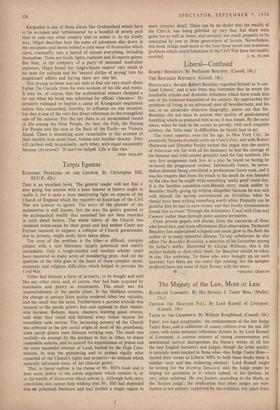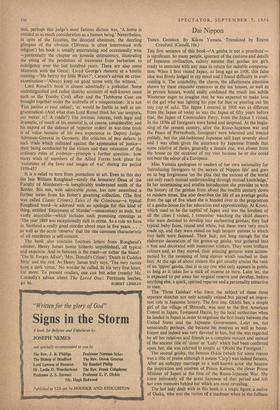The Majesty of the Law, More or Less
THOUGH THE HEAVENS FALL. By Lord Russell of Liverpool. (Cassell, 18s.) TALES OF THE CRIMINOUS. By William Roughhead. (Cassell, 18s.) FIRST, two legal scrapbooks : the reminiscences of the late Judge Tudor Rees, and a collection of causes celebres over the last 200 years, with some personal reflections thrown in, by Lord Russell of Liverpool. A curious mixture of strong commonsense and sentimental nalVete distinguishes the literary works of all but the best English barristers and judges, though the latter quality is certainly more marked in those who—like Judge Tudor Rees— started their career as Liberal MPs. In both these books there is another rarer and less endearing element: Lord Russell might be writing for the Evening Standard, and the Judge might be hoping for quotation in it—which indeed, in his lifetime, he very often achieved, He was known, according to the blurb, as the 'human judge'; the implication that other judges are non- human is not entirely supported by the evidence, but apart from
that, perhaps this judge's most famous dictum was, 'A horse is entitled to as much consideration as a human being.' Nevertheless, in spite of the fatuities, the decayed cheStnuts, the dazzling glimpses of the obvious ('Divorce is often intertwined with religion') his book is usually entertaining and occasionally wise —particularly the chapter on juvenile delinquency, illustrating the swing of the pendulum of treatment from barbarism to indulgence over the last hundred years. There are also some Moments with the Great : Lloyd George's rhetoric at a hostile meeting—'Me betray my little Wales?'; Carson's advice on cross- examination—`Always keep on good terms with the witness.'
Lord Russell's book is almost admittedly a potboiler. Some undistinguished and rather sketchy accounts of well-known cases such as the Tranby Croft affair and the Tichborne Case are brought together under the umbrella of a misquotation: it is not 'Fiat justitia et ruat cxlum'; 'et' would be feeble as well as un- grammatical. (And what does Lord Russel think his 'ant tempora, aut mores' is? A riddle?) The intrinsic interest, both legal and dramatic, of much of his material is, of course, considerable; and his expose of the defence of 'superior orders' in war-time trials is of value because of his own experience as Deputy Judge- Advocate-General in Germany. His criticism of two defects in such trials which militated against the appearance of justice— their being conducted by the victors and their relaxation of the ordinary rules of evidence—prompts a further question : how many trials of members of the Allied Forces took place for 'violations of the laws and usages of war' during the period 1939-45?
It is a relief to turn from journalism to art. Even to this day the late William Roughead—surely the honorary Dean of the Faculty of Murderers—is inexplicably underrated south of the Border. His son, with admirable pietas, has now assembled a further series from his father's gleaming collection. (The first was called Classic Crimes.) Tales of time Criminous—a typical Roughead word—is adorned with an apologia for this kind of thing, entitled 'Enjoyment of Murder'—unnecessary as such, but vastly enjoyable—which includes such promising openings as 'The year 1889 was exceptionally rich in crime. As a rule we have in Scotland a really good murder about once in five years. . . as well as the acute 'observe' that the one common characteristic of all murderers is self-conceit.



































 Previous page
Previous page